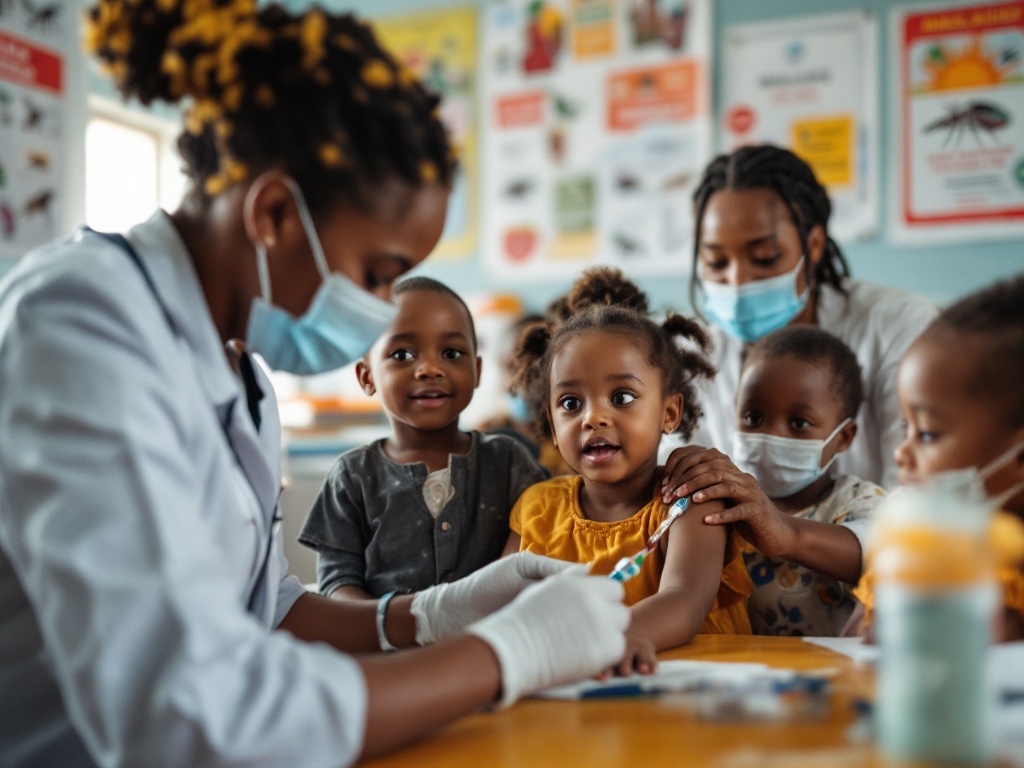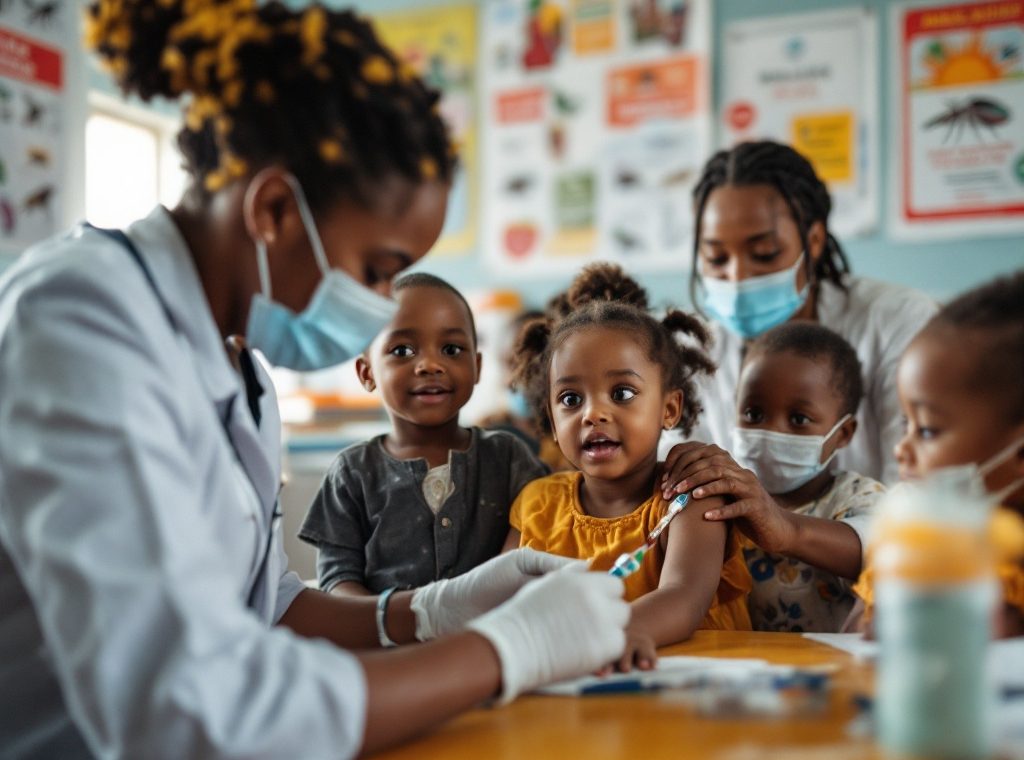Malaria Vaccine: What You Should Know
Malaria claims hundreds of thousands of lives annually, but hope shines through with new vaccines. These vaccines activate the body’s defenses against the deadliest malaria parasite, *Plasmodium falciparum*. Promising vaccines like RTS,S and R21, offering up to 75% protection, are now available, primarily for children in high-risk areas. While current vaccines offer significant protection, especially when combined with bed nets and medication, research continues to improve their longevity and efficacy. Learn more about these groundbreaking vaccines and their role in the fight against malaria.
Important information

- Malaria vaccines, like RTS,S and R21, significantly reduce malaria cases and severity, especially in children.
- The WHO recommends the RTS,S vaccine, a four-dose regimen starting at five months old, for children in high-transmission areas.
- R21, another promising vaccine, shows up to 75% efficacy in preventing malaria.
- Malaria vaccines are most effective when used with other preventative measures, such as bed nets and antimalarial drugs.
- Research continues to improve vaccine effectiveness and longevity for long-term protection.
Malaria Vaccine: Revolutionizing the Battle Against Malaria
Malaria vaccines are revolutionizing the fight against this devastating disease. In 2021 alone, malaria caused millions of illnesses and hundreds of thousands of deaths, but new vaccines offer a beacon of hope. By activating the body’s defenses and training the immune system to combat the malaria parasite, these vaccines can prevent infection or reduce its severity. They complement existing tools like bed nets and antimalarial drugs, which provide essential protection. Several promising vaccines, some showing positive results against *Plasmodium falciparum* (the deadliest malaria parasite), are currently under development. These injectable vaccines primarily target children, particularly those in high-transmission areas where they are most vulnerable. While not perfect, current vaccines represent significant progress. Researchers are continually striving to improve their effectiveness and longevity, making the future of malaria control brighter than ever before.
How Malaria Vaccines Work
Malaria vaccines mainly target the *Plasmodium falciparum* parasite, the most common and dangerous cause of malaria. One example is the RTS,S vaccine, which disrupts the parasite’s life cycle in the liver and bloodstream, thus reducing the risk of infection. This vaccine requires four doses.
Targeting the Plasmodium Falciparum Parasite
The RTS,S vaccine combats the malaria parasite by targeting a surface protein called circumsporozoite protein (CSP). This protein is present during the sporozoite stage, the form transmitted through mosquito bites. By targeting CSP, the vaccine aims to prevent the parasite from infecting the liver, a crucial step in the malaria life cycle. The RTS,S vaccine is specifically designed for children living in regions with high malaria transmission.
The Role of the Immune System in Vaccine Efficacy
Malaria vaccines, such as RTS,S and R21, utilize the power of the immune system to combat the *Plasmodium falciparum* parasite. By activating the body’s defenses, these vaccines prepare it to fight infection, reducing both the likelihood and severity of malaria. The success of both demonstrates the critical importance of a robust immune response for protection.
Exploring Current Malaria Vaccines: RTS,S and R21
Two key malaria vaccines, RTS,S and R21, are showing promise in clinical trials. While RTS,S offers 30-50% protection for young children, its effectiveness wanes after several months. R21 is another potential vaccine candidate currently under investigation. Ongoing research aims to develop vaccines with improved and longer-lasting protection against a wider range of malaria strains, a vital step for global health.
RTS,S Vaccine: Clinical Trials and Safety Profile
The RTS,S/AS01 malaria vaccine has demonstrated promising results in rigorous clinical trials. The vaccine significantly reduced malaria cases in young children by 30-50% over several months. It also decreased the incidence of clinical malaria by 39% and severe malaria cases by 30%. Importantly, the RTS,S vaccine has a good safety profile.
R21 Vaccine: WHO Recommendations and Efficacy
The World Health Organization (WHO) has endorsed the R21/Matrix-M malaria vaccine, their second such approval. This highly effective vaccine has demonstrated a remarkable ability to reduce malaria cases, potentially by as much as 75%, particularly in regions with seasonal transmission. The vaccine is primarily intended for children living in high-risk areas.
Comparison: RTS,S vs. R21 Vaccines
The RTS,S vaccine offers significant protection against malaria, reducing cases by 39%.
Both vaccines offer seasonal protection, preventing approximately three-quarters of malaria episodes.
The R21 vaccine provides even greater efficacy with a remarkable 75% reduction in malaria infections.
This marks a crucial advancement in the fight against this disease.
Efficacy and Impact of Malaria Vaccines
Malaria vaccines are proving highly effective, reducing uncomplicated malaria cases by approximately 40% and severe cases by about 30%. They even contribute to a 13% decrease in all-cause mortality. However, these vaccines are most impactful as part of a comprehensive strategy incorporating insecticide-treated bed nets, indoor residual spraying, and antimalarial medications.Seasonal administration of these vaccines further enhances their protective effects, significantly lowering malaria incidence, particularly in high-transmission settings. This targeted approach amplifies the success of vaccination programs in endemic areas. Primarily designed to combat *Plasmodium falciparum*, the most dangerous malaria parasite, the vaccines train the immune system to recognize and attack this specific species, thereby preventing infection or mitigating its severity.
Reducing Uncomplicated and Severe Malaria
The RTS,S and R21 vaccines are vital weapons in the fight against malaria, significantly reducing both mild and severe cases, and ultimately saving lives.
Seasonal Administration and Malaria Cases Reduction
Seasonal malaria chemoprevention (SMC) protects children from malaria during high-risk seasons by administering full courses of antimalarial medication. Endorsed by the World Health Organization (WHO), SMC significantly lowers both malaria cases and fatalities in children. Vaccines provide further defense against malaria. For instance, RTS,S and R21 target the parasite before it reaches the liver, thus preventing malaria’s development. Administering these vaccines during peak season has proven effective in reducing malaria incidence. Both SMC and vaccines offer powerful weapons in the fight against this disease.
Implementation and Rollout of Malaria Vaccines
The WHO recommends the RTS,S/AS01 (RTS,S) malaria vaccine for children living in regions with high malaria transmission. This four-dose vaccine begins with three monthly doses starting at five months of age, followed by a final booster at 15–18 months. While a significant advancement, RTS,S is most effective when combined with other preventative measures like insecticide-treated bed nets and indoor residual spraying. Prompt diagnosis and treatment remain critical. The vaccine’s ultimate goal is to shield children from malaria’s impact by reducing overall cases and lessening the severity of infections requiring hospitalization.
WHO Recommendations for Vaccine Schedules
The World Health Organization (WHO) recommends a four-dose malaria vaccine regimen for children living in areas with moderate to high malaria transmission. The vaccination begins at five months of age. This important initiative aims to substantially reduce malaria cases and prevent deaths among these vulnerable young children.
Vaccination for Children in Malaria-Endemic Areas
Vaccination is crucial for protecting children in high-risk malaria areas. Alongside bed nets and medication, it forms a vital part of preventative care. Administered through injection, the vaccine bolsters the immune system against malaria. While multiple doses are typically required for optimal efficacy, even current vaccines offer substantial benefits, significantly decreasing the incidence of severe malaria and lowering the overall risk of infection.
The Future of Malaria Vaccines
Developing a malaria vaccine is crucial for eradicating this disease, but its success depends on integration with existing control measures. Current research focuses on improving vaccine efficacy and duration of protection. Scientists are also exploring new vaccine candidates and technologies. The ultimate goal is to create vaccines that offer robust, long-term immunity, possibly by targeting multiple stages of the parasite’s life cycle. These vaccines must be integrated with existing tools like bed nets and antimalarial drugs to maximize their impact. This combined approach is essential for eradicating malaria.
Advancing Towards Malaria Elimination
Malaria vaccines are crucial in combating this disease, supplementing existing control measures. They are particularly important for safeguarding children, the most vulnerable population in malaria-stricken regions. Current vaccines offer varying levels of protection, demonstrably reducing malaria infections, especially severe cases. Scientists are diligently working to enhance these vaccines, striving for improved efficacy and longevity. Integrating vaccines with proven strategies like insecticide-treated bed nets and antimalarial drugs is essential for maximizing their impact and furthering the goal of global eradication.
Integration with Current Malaria Control Strategies
Malaria vaccines complement existing tools like bed nets, insecticide spraying, and antimalarial drugs. This multifaceted approach significantly enhances protection, especially for young children. Vaccines provide added defense, but their effectiveness varies. Some substantially decrease the risk of malaria and severe disease, but no vaccine offers complete immunity. Therefore, research continues to pursue improved options.
Current Malaria Vaccines
While some vaccines are highly effective against severe malaria, others offer less protection, prompting ongoing research to enhance effectiveness and duration. Real-world data is crucial for understanding the impact of these vaccines, which range from partial protection to reducing disease severity.
Future of Malaria Vaccines
Numerous promising vaccine candidates are currently in clinical trials, aiming to achieve long-term protection suitable for widespread use in malaria-endemic regions.

















